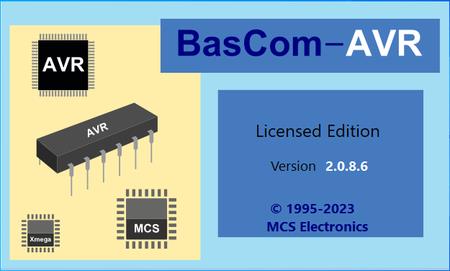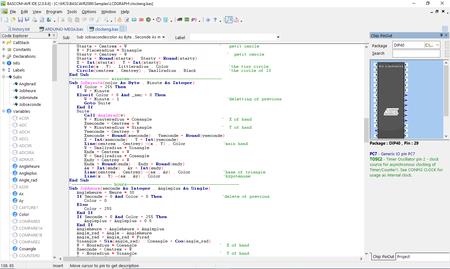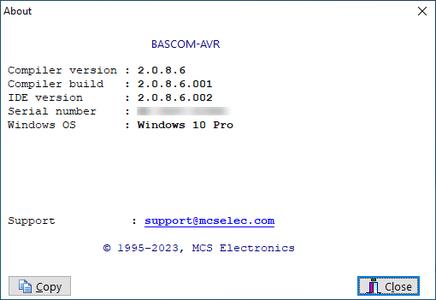
Free Download BasCom-AVR 2.0.8.6.002 Multilingual Free Links | 44.1 MB
Languages: English, العربية, Čeština, Deutsch, Français, Italiano,
Magyar, Nederlands, Polski, Português, Русский, Slovenščina, Slovenčina
BasCom-AVR is the original Windows BASIC compiler for the AVR family of microcontrollers. These are modified Harvard architecture 8-bit RISC single-chip microcontrollers. AVR was one of the first microcontroller families to use on-chip flash memory for program storage, as opposed to one-time programmable ROM, EPROM, or EEPROM used by other microcontrollers at the time.
Microchip AVR (formerly Atmel AVR) is an 8-bit microcontroller family from the US manufacturer Microchip. The controllers in this family are also widely used by hobby users because of their simple structure, easy programmability, powerful development tools and availability. Microcontrollers bridge the gap between hardware and software - they run a program like a regular computer, while at the same time being discrete elements that can interact with other circuit components.
AVR microcontrollers find many applications as embedded systems. They are especially common in hobbyist and educational embedded applications, popularized by their inclusion in many of the Arduino line of open hardware development boards.
Key Benefits
Structured BASIC with labels.Structured programming with IF-THEN-ELSE-END IF, DO-LOOP, WHILE-WEND, SELECT- CASE.Fast machine code instead of interpreted code.Variables and labels can be as long as 32 characters.Bit, Byte, Integer, Word, Long, Single, Double and String variables.Large set of Trig Floating point functions.Date & Time calculation functions.Compiled programs work with all AVR microprocessors that have internal memory.Statements are highly compatible with Microsoft's VB/QB.Special commands for LCD-displays , I2C chips and 1WIRE chips, PC keyboad, matrix keyboad, RC5 reception, software UART, SPI , graphical LCD, send IR RC5,RC6 or Sony code.TCP/IP with W3100A/W5100/W5200/W5300 chips.Built in AVR-DOS functions like MKDIR, CHDIR, DIR, OPEN, CLOSE, etc. Just as they work in QB/VB !Local variables, user functions, library support.Integrated terminal emulator with download option..Integrated simulator for testing.Integrated ISP programmer (application note AVR910.ASM).LPT based STK200 programmer and STK300 programmer. Also supported is the low cost Sample Electronics programmer. Can be built in 10 minutes! Many other programmers supported via the Universal Interface.Many supported programmer like STK500, STK600, MKII, USBASP, JTAG , Arduino V1 and V2 (STK500V1 and STK500V2), MCS UPDI programmerEditor with statement highlighting.Context sensitive help.DEMO version compiles 4KB of binary code. Well suited for the ATmega48.English, Dutch an German Books available.AT mouse simulator, AT keyboard simulator, I2C Slave, USB device mode programming available as add on.BASCOM-AVR supports the tiny, mega and Xmega processors with internal SRAM and 32 registers.This product is developed in 1995 and is updated regularly.
To make a program takes just a few steps:
Write the program in BASICCompile it to fast machine binary codeTest the result with the integrated simulator(with additional hardware you can simulate the hardware too).Program the chip with one of the integrated programmers.
What's new in BasCom-AVR 2.0.8.6.002
config sections are also grouped for code collapsetoggle code improved for word,int,long. Also bug fixed when toggle as used on a port with constant like porta.pd3spi1move and spimove for xtiny using manual SS setting would set DDR instead of PORT registerSW UART Inkey, Input, Waitkey revised for $timeout. $timeout maximum value is &HFF_FF_FF for the SW UART. Input will end when one of the incoming characters times out.attiny861 , START TIMER did actual stop the timer since the wrong value was written.buffered serial port changed. since a global variable is used for the buffer count, the interrupts are disabled and reenabled during updating this variable. but users that use the BYTEMATCH option in combination with serial input code like input, inputbin, etc. autmatic enable the interrupts since reading disable/enables global interrupts. this can lead to problems. it is not good practice to read data from the interrupt but since many users seems to use this we changed the CLI/SEI so that the I-flag is restored and thus global ints are not enabled by reading inside the ISR.using rnd() with config rnd=32 on a word/integer result in an internal variable errori2cv2_timeout.lib added which is the same as i2cv2.lib but with a time out in case no devices are connected.config comx txpin becomes TX_RX_XC_XD_PIN this better reflects that all pins belonging to the USART will have an alternative pin valueconfig comx for xtiny platform has a new option : TX=DISABLED|ENABLED and RX=ENABLED|DISABLED by default both TX and RX are enabled. but you can disable the Transmitter or ReceiverM324PBdef.dat updated to support second TWI channelincluded fonts for graphical LCD are now word aligned. this in case the user uses multiple END statements.drivers(libs) updated that were unsafe when using port pins on an extended address.I2C_TWI-MULTI.lib : i2cstop missed setup call to _i2c_chan_setup when CONST _TWI_STOP_TIMEOUT was not defined resulting in a hang upAVR-DOS updated for xtiny and added sample files : FlashCard-demo-XTINY.bas , Config_MMCSD_HC_XTINY.inc , CONFIG_AVR-DOS.incbootloader added for megax : BootLoader-MegaX.bas the file m4808-tca0-BOOT.bas can be used to load to demo $romstartdim SAFE changed see helpval() to a double for a string with leading + would result in NAN.decr/incr did not protect variables dimmed with SAFEeditor multi search highlight and multi selection highlight addedcom5 and com5 buffered output for xtiny bug fixed where there was a double label used.RTF export now capitalizes IO registers, just as they appear on screen.simulator now uses a separate register space. old AVR, xmega and xtiny have different memory maps. while older AVR can reach the registers by a pointer, the xmega and xtiny can not do so. while desgning the simulator there was one memory area. but it turned out that some instructions writing to registers, actually wrote to lower IO space. So this has been rewritten. This means that a lot of the simulation code has been changed. Please report any simulation bug to support.config dmxslave support added for xtiny platformxtiny buffered serial input for com5 and com6 gave a duplicate label errorfixed: some programmers like stk200,stk300, kamprog have no icon any longer in the toolbar. and the chosen size was not working either.clearing history in search box did not work properly(right mouse button)config tcpip for w5500 supports xtinyCLS in $ASM block mistaken as BASIC CLSshiftout number_of_bits would not accept a local/parambuffered serial output com5 for xmega caused an errordcf77 xtiny support TCA0user EDC had a good idea about notification of usb-serial ports. you are notified with an alert window when a CDC is added or removed$programmer extended with constants for programmers and additional COM parameter. prog.inc contains the constants for the programmerswritedac statement added for xtiny platformsimulator usart emulation added for xtiny platformbaud statement implemented for Xtinygetrc5 xtiny support, also background mode added for tcbx. check config-rc5 in the help and the avrx128da28-RC5-Background-send-receive.bas samplerc5send xtiny support, check config rc5sendconfig strcheckconfig tca0 splitmode fixed. see also the example. this also requires an update of all DAT files.$romstart number of bugs in simulator fixed (elpm, lpm)Baud statement improved. it did not support channels for a HW UART. it will also raise an error when you try to use non existing channels.FM24C64_256-XMEGA.lib support for strings added.updi dat files for mega808,1608 and 3208. also added 64DB32,128DB32,128DA48,128DA32,32DA48,64DA64,128DA28updi programmer enhanced, it works up to 1.6 Mbaud now. not all processors support this. See help. Also added unlock chip function and chip reset is supported. also added lockbit table to DA/DB series. these platforms use a 4 byte ID to lock.updi can use DTR/RTS for switching data and/or a 12V pulse. 12V pulse is used to access UPDI when the updi/reset are shared and the pin is programmed for reset function.tcpip w5500 corrected a bug for xmega with > 64KB processors. mixing tcpwrite and tcpwritestr could result in sram accessing a wrong page.some checks added for string assignment/passing byval. when constants are used that are too big you get an error. you also get an error when you claim more temp memory than specified with $framesizestring to double conversion with string in scientific notation conversion bug fixed when there was a leading minus. also added support for the bigger xtinies.some screen scaling problems fixed.DB/DA series use a different method for the UPDI fuse/eeprom/signature writing. This is corrected.xtiny with 128 SRAM did not simulate correct. Also the MSB of pointers were not set since normal AVR do not need this for 128 SRAM chips. since xtiny has a different memory model this lead to memory bugsoptimization did not recognize flag registers. code like : portf_flags = portf_flags would not be executed.kamprog icons were not visiblewriting a constant to an eeprom string on a normal AVR would failclosing bascom with programmer window open produced an access errorlib manager can add a routine from the clipboardint_trig.lib 64K boundary bug fixed (qsin/qcos)xtiny/megaX dat files had ADC value exchanged for 8bit/10bit resolution selectionmcucr register was not properly cleared at start up for old AVR processors. only the WD flag was reset, notice you should not write a 0, since some AVR have other unrelated bit flags in the MCUCR register! Processors like that will have an additional mask in the dat file : WD=MCUCSR.WDRF,$E0assigning a hex number to a double did not work for all numberswaitkey() for the software uart did not support timeout.


Rapidgator
zlu66.BasComAVR.2.0.8.6.002.Multilingual.rar.html
NitroFlare
zlu66.BasComAVR.2.0.8.6.002.Multilingual.rar
Uploadgig
zlu66.BasComAVR.2.0.8.6.002.Multilingual.rar
BasCom–AVR 2.0.8.6.002 Multilingual Torrent Download , BasCom–AVR 2.0.8.6.002 Multilingual Crack Download , BasCom–AVR 2.0.8.6.002 Multilingual Patch Download , BasCom–AVR 2.0.8.6.002 Multilingual Serial Keygen Download
